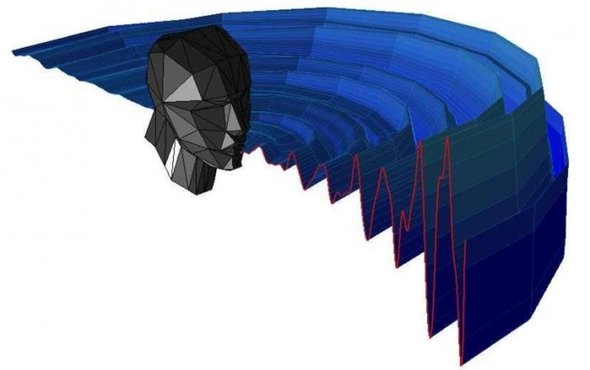(单词翻译:单击)
听力文本
This is Scientific American — 60-Second Science. I'm Christopher Intagliata.
Many bats use a system similar to sonar to navigate in the dark. They send out high frequency sound, sometimes as clicks, and get information about their surroundings by the timing and quality of the sound that bounces back. And just as turning up the light in a darkened room helps to illuminate the objects there, bats are known to turn up the intensity of their clicks when they have trouble detecting a target.
"Now, bats have had millions of years of evolution basically to sort of develop these mechanisms to dynamically adjust their emissions." Lore Thaler, a neuroscientist at Durham University in the U.K. "And what we were wondering is, well, do people do the same?"
Because some people with impaired vision can indeed navigate using the echoes of finger snaps, hand claps, or mouth clicks (clicking sound). But it's not known how dynamic that ability is. So Thaler and her team presented eight expert echolocators with a challenge: could they tell whether a small dinner-plate-sized object was being held up about three feet from their head, by clicking alone?

You can try this at home by the way, with a plate or a book. "And if you hold it very close to your face while you're speaking you can notice that the sound that you hear really changes. This is because the sound that comes out of your mouth when you speak is reflected by the object you're holding in front of you. And that's an echo."
But move the plate 45 degrees to the side...then 90...then behind your head. And the task gets harder. But similar to the way bats do, the study subjects increased the number of clicks, and their loudness, (loud clicks) as the object became harder to detect—perhaps as a way to amplify the weak sounds echoing back.
The subjects still had trouble detecting the object a full 180 degrees behind them—they did only slightly better than chance. But they guessed correctly 80 percent of the time when the object was diagonally behind them. And nabbed nearly perfect scores when the disc was to the front or to the side. The results are in the Proceedings of the Royal Society B.
Thaler says the study gives echolocating learners a shortcut: "If you're not sure, make a couple more clicks, and also make them louder." To produce echoes that more accurately reflect the world.
Thanks for listening for Scientific American — 60-Second Science. I'm Christopher Intagliata.
参考译文
这里是科学美国人——60秒科学。我是克里斯托弗·因塔利亚塔。
许多蝙蝠使用类似于声纳的系统在黑暗中飞行。它们会发出高频率声音,有时像“咔哒声”,并利用声音返回的时间和质量来获取周围环境的信息。就像在黑暗房间里开灯有助于照亮物体一样,人们了解到蝙蝠在探测目标遇到困难时,也会提高“咔哒声”的强度。
“现在,蝙蝠已经经历了数百万年的进化,基本形成了这种动态调整声音的机制。”英国杜伦大学的神经科学家洛尔·塔勒说到。“我们想知道的是,人类也是这样做吗?”
因为一些视力损伤人士的确可以利用响指、拍手或咂舌声的回声来定位。(咂舌声)但是目前人们并不知道这种能力的动态程度。因此,塔勒和团队向8个专业回声定位仪发出了挑战:将一个餐盘大小的物体置于头上三英尺处,看看它们是否能仅凭声音找到这个物体。
顺便说一下,你在家可以用碟子或是书来试一下。“如果你在说话时将物体靠近你的脸部,你会发现你听到的声音发生了变化。这是因为,你说话时发出的声音被你面前所拿的物体反射了。这就是回声。”
但是,将盘子向一侧移动45度,然后再移动90度,之后转到头后。这会导致越来越难以找到盘子。但是与蝙蝠的做法相同,随着物体越来越难以检测到,回声定位仪增加了“咔嗒声”的频率,声音也越来越大,这可能是一种放大弱回声的方式。
在物体转180度至回声定位仪后面时,回声定位仪也很难检测到物体,检测准确率只比随机稍高一些。但是,当物体位于回声定位仪斜后方时,回声定位仪的检测准确率高达80%。而当碟子在回声定位仪前面或侧面时,仪器几乎全能检测到。这项研究结果发表在《英国皇家学会学报:B辑》上。
塔勒表示,这项研究给回声定位研究者提供了一个捷径:“如果你不确定,那就多发出声音,提高音量。”用这种方法来产生能更精确反应世界的回声。
谢谢大家收听科学美国人——60秒科学。我是克里斯托弗·因塔利亚塔。
译文为可可英语翻译,未经授权请勿转载!
重点讲解
重点讲解:
1. send out 发出(信号、声音、光、热等);
Customer complain the system send out great noise.
客户投诉说他的系统发出很大的噪音。
2. turn up 开大,调高(收音机、暖气等);
Bill would turn up the TV in the other room.
比尔会把另一个房间里的电视声音开大。
3. by the way 顺便地;附带说一句;
By the way, I'm your number-one fan.
顺便说一句,我是你的头号粉丝。
4. in front of 在…前面;靠近…前部;
There’s a bus stop in front of the house.
房子前面有一个公共汽车站。


